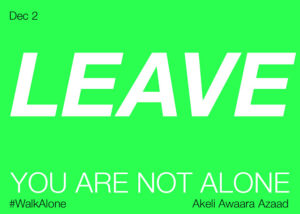Lea Goelnitz, Delhi, India, Former Blog Correspondent
“When I walk down the streets I put on my death stare and scan every man´s face, I pass by. Their eyes are not on my face, but all over my body. I hold my head high and my hands make a fist. I am ready to fight anyone who comes near me. I am afraid, but more than that I am angry, really angry,” one young woman in Delhi tells me.
We actually talked about something else entirely, but when two women in Delhi meet, the conversation almost always turns to harassment and how to deal with it. Safety and freedom are the buzzwords we throw in. In the absence of both, these big words become tiny demands for dignity.
“I want to ride the metro in the middle of the night – unaccompanied and without a knot in my stomach“ a woman tells me.
Another one wants “to explore unknown neighborhoods and enjoy sights, admire their beauty and get lost in the crowds in narrow lanes.” But they say they cannot. With all the responsibility for their own safety put on them – What did you wear? Where did you go? Did you send a screenshot of your Uber ride to a friend? How late was it? Did you drink? Were you alone? What did you say? – there is little energy left to enjoy a stroll through the city.
Women are conscious about what to wear, which route to take, who to ask for directions and what mode of transport to take. Being on guard constantly is work, which drains lots of energy. This work is neither acknowledged nor rewarded. Still women are blamed if they don’t do “their part”. The regular obnoxious and very offensive rape analogies spit up by politicians and judges every now and then reinforce the idea that women are solely in charge for their safety and perpetrators cannot help themselves. It also sends a very clear message to all women: You are in this alone. Society will not change and no one will help you.
And of course this narrative is also offensive to men, dehumanizing them as out of control and overpowered by urges. Weirdly men do not seem to be bothered by that.
The focus remains on women: There are women-only compartments in metros and buses. A liquor store has a women-only section and advertises harassment-free alcohol shopping. This way men will never have to get used to the existence of women in public. Uber has safety buttons in their cars. From January 2017 onwards, all mobile phones in India are required to have a safety button. The pepper spray sold in shops and via amazon comes in a pink design. There also are plenty of apps which crowdsource safer ways home or send alerts and emergency texts and your GPS to your contacts. Technology and the market adapt to any tragedy.
While all of these may have value as short term solution, they are also distractions, adding more to the list women feel they must do for their own safety. Women´s physical and psychological well-being become collateral damage. Why don’t you have the app? Why didn’t you buy that new phone? Why did you get into the Uber without checking if it has the button already? Why didn’t you take that self-defense class? All this easily leads to: Why don’t you stay at home?
There is another way to approach safety concerns. Various feminist initiatives show victim-blaming the finger, change the discourse about responsibility and encourage fear to be turned into anger and confidence.
 The campaign #HaveShortsWillSmoke by ”the spoilt modern Indian woman” asks women to share pictures of them wearing shorts or skirts and having a drink or smoking and share the comments they got in public. The initiative Blank Noise exhibits clothing of women, they wore when they were harassed. Of course, all kinds of clothes are represented, debunking the myth that covering up is a solution. #Walkalone and #FreeFromFear are the hashtags women use to demonstrate how they took a route, which they walked despite being afraid. Blank Noise declares them to be Sheroes, as they do not let fear influence their mobility and independence. Safecity started documenting areas that feel safe in order to encourage more women to come out and make the area even safer.
The campaign #HaveShortsWillSmoke by ”the spoilt modern Indian woman” asks women to share pictures of them wearing shorts or skirts and having a drink or smoking and share the comments they got in public. The initiative Blank Noise exhibits clothing of women, they wore when they were harassed. Of course, all kinds of clothes are represented, debunking the myth that covering up is a solution. #Walkalone and #FreeFromFear are the hashtags women use to demonstrate how they took a route, which they walked despite being afraid. Blank Noise declares them to be Sheroes, as they do not let fear influence their mobility and independence. Safecity started documenting areas that feel safe in order to encourage more women to come out and make the area even safer.
These are small steps and low-scale initiatives not having a big impact one might argue. But as opposed to the above mentioned “security measures”, which not only rely but bet on women´s fear do not even scratch the surface of the problem, but sustain the status quo, these feminist ideas provide a much-needed refreshing and creative input that inspires courage, anger and action. More please!
Lea works in journalism and women´s rights and is involved in the women´s rights NGO Discover Football, which uses football as a tool for empowerment and gender equality. Follow her on Twitter, @LeaGoelnitz.
